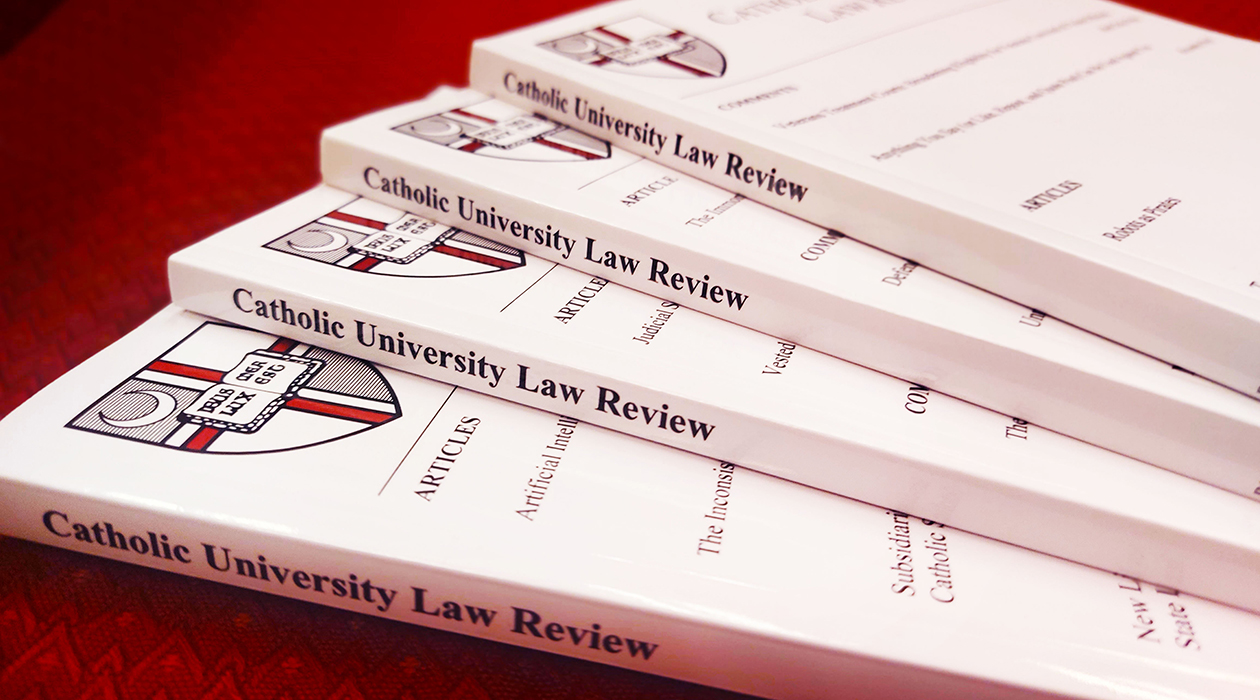Volume 75, Issue 1
Fall 2025
ADDRESS
A Conversation with Judge Stephanos Bibas
(Bibas and Walsh) Abstract. On Friday, March 28th, 2025, the Catholic University Law Review hosted its annual spring symposium: Traditional Judicial Power & Doctrinal Development, which included a conversation between Judge Stephanos Bibas and Professor Kevin C. Walsh. The conversation covered topics such as standing, severability, and preliminary injunctions. This is a transcript of the conversation, and the text appears substantially as it was delivered. . .
ARTICLES
Rules of Decision, Judicial Power, and the Valid Rule Requirement
(Harrison) Abstract. Some current Supreme Court debates that concern seemingly specialized issues raise fundamental questions about the role of the Constitution in the legal system and the role of the courts when they decide constitutional issues. In recent years, Justice Thomas has suggested that the doctrines of First Amendment overbreadth, so-called third-party standing in cases involving constitutional liberty, and statutory inseverability call on federal courts to exceed their role under Article III. . .
Splitting the Statute: Severability as a Canon of Construction or Constitutional Concern?
(Moore) Abstract. Severability doctrine stands at the crossroads of statutory interpretation and constitutional structure. This Article traces how the Supreme Court has struggled to define whether severability is merely an interpretive presumption designed to preserve as much of Congress’ work as possible, or a constitutional limit on judicial power that forbids courts from reconstructing statutes Congress never enacted. . .
Rethinking Judicial Power & Remedial Restraint
(Roberts) Abstract. This Article maintains that groundbreaking Supreme Court cases reshaping judicial power and restraint are frequently remedies centric. The much- anticipated ruling in Trump v. CASA illustrates this correlation. Interpreting traditional equity, the Supreme Court circumscribed federal judicial power to issue universal relief. The Court relied on Marbury v. Madison to bolster its reasoning on the limits of judicial power. . .
Disregarding Severability
(Walsh) Abstract. The infirmities of severability doctrine have elicited increased attention at the Supreme Court. In his application of severability doctrine for a five-Justice majority in United States v. Arthrex, Inc., Chief Justice Roberts began to reformulate the doctrine in a way that can free the Court from the misleading mental imagery conjured by the conception of courts as “severing” provisions from a statute. . .
ESSAY
Facial Challenges, Remedies, and the Judicial Power
(Schmidt) Abstract. The Supreme Court has long maligned facial, as opposed to as-applied, challenges to the constitutionality of statutes, warning that they are disfavored and difficult to win. But recently, in his separate opinion in Moody v. NetChoice, LLC, Justice Thomas has launched a stronger attack: facial challenges are improper exercises of the judicial power. Facial challenges, he asserted, require courts to go beyond the case or controversy before them, improperly distort standing doctrine, and thus violate Article III of the U.S. Constitution. . .

